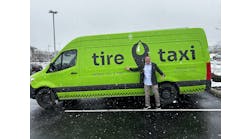The average mid-sized single independent repair shop services about 10,000-12,000 retail customers a year. They do this nobly. They do this generally without incident.
Sure, there can be disagreements and miscommunication at times, but since most small businesses are built on reputation, owners must usually be significantly generous in their attempts to resolve conflicts with customers. Truth be told, in my 25 years of experience, it’s the customer who is usually wrong (I like to call it “passionately misinformed”), but if you want to stay in business, it’s the owner and the employees who need to resolve the difference between facts and truth.
However, that’s not to say there aren’t bad actors in the retail tire business. Very few are downright morally a mbiguous. A handful just lack decency. And some don’t know better. These are the players who give us all a bad name.
I want to share with you something I see several times every year. It’s called “Sweeps Week.” Every year in the months of November, February, May and July, television stations collect data from viewers that they use to set their rates for commercials and other promotions. These are the months where the networks really try to juice up a show’s content.
One of their favorite targets is the automotive repair industry. In the month prior to Sweeps Weeks (October, January, April and June), you can expect an uptick in “undercover” or “sting” news segments, “gotcha” nightly news reports, and other methods. Here’s what the TV networks are looking for.Fraud. They primarily want to catch a salesperson selling something that isn’t “needed” or selling something that isn’t performed. Some stations legitimately put a marker on a filter to see if it gets replaced. Some stations get a pre-inspection to establish a baseline. Some stations get a little more morally blurry and stage a symptom, hoping to trap a business in a poor diagnosis. In every instance, it is always up to the business to make sure that work sold is legitimate and performed.
Never use the word “needed.” It is misleading to customers. Since the conversation between a salesperson and customer is unbalanced (the salesperson holds the majority of power and knowledge), the word “needed” can be seen as manipulative. Does it mean safety? Does it mean convenience? Does it have a meaning of time frame? It’s a bad word for the industry. Get rid of that word from your shop. Ban it. Start a curse jar, $5 for anyone who says the word “needed.”
Use these words instead: “required” and “recommended.” There is very little confusion as to what those two words mean. Required means the item no longer can fulfill its original purpose in some way. Brakes no longer function as indented because there isn’t any friction material left. A bulb is burnt out. An air filter is oily. “Required” means the car does not perform as originally intended.
“Recommended” means the car will function fine, but there’s an item you may wish to address now to avoid a future problem or eliminate the need to return for the work. Tires at 3/32nds. A dirty air filter. You get the idea.
Emotional reaction. Nothing in human behavior gets people’s interest more than an emotional train wreck. The camera rushes into the store, the reporter breathlessly runs to the advisor or store manager, and exclaims that the store has been caught red handed! “Gotcha! What do you have to say for yourself?” And the manager then angrily pushes the reporter or slams his hand over the camera and yells “Stop filming! You have no right to be here! Get your cameras out of here!” I’ve even seen where the manager goes to his office, but he lets the cameraman follow. He calls his boss, and on TV says, “Uhh, they caught us. What should I do?”
Here’s what you need to do. First, you need to practice with your employees. They need to know what it feels like to be put on the spot in front of a camera, and how to react. You can’t just talk about it. You have to practice it so they develop, in a sense, “muscle” memory. The key is to stay calm, cool, collected. Employees must first breathe.
Secondly, understand that any action or any words can be taken grossly out of context. Be polite, and simply ask the reporter, repeatedly if necessary, to leave the private property. Just repeat the same way over and over again in a calm manner until the reporter relents. They will, eventually. Reporters cannot interfere with the daily business of the company. When the reporter has left, it’s time to go up the chain of command. The boss (whoever is in charge) should begin some level of investigation to see if the accusations are credible.
“Credible” simply means if there is smoke, it doesn’t have to be a five alarm fire to be credible. If it is credible, the owner or person responsible for media relations (now you know why you shouldn’t have your 22-year-old niece or nephew as your media person just because they are “good” at Facebook) must provide a truthful, but carefully worded statement that after investigation it was found to be credible and the company is taking appropriate steps to correct and prevent this type of incident from ever occurring again. This includes disciplinary action and education of remaining employees. If there were several employees — or worse, you find it was ongoing with multiple incidents — you should be harsh in punishment, as often corruption is a poison that infects the whole shop. If it was isolated, and the person was acting outside the rules of the company, then a simple termination and meeting for other employees explaining acceptable conduct should be enough.
Escalation. Reporters during Sweeps Week are out to do one thing: get the viewer to panic so the word spreads, which will increase rates. It’s pretty sneaky how this gets done, but follow me on this: The story starts with “is your mechanic cheating you?” or some version thereof. It’s a broad brush to paint with. Most people don’t know how to work on their cars, so they are vulnerable to manipulation. Then the reporter talks about the one shop they did their sting in by name, but halfway through the story the reporter goes back to general statements like “repair shops” and “employees.”
This generalization is done to make people think that this type of fraud is rampant, but what reporters do here is hurt the entire industry. So every time this segment is run on the news, even if you’ve never been targeted, your business will suffer from this type of “associative connection.” When customers become suspicious, every little mistake or hiccup in the process becomes magnified and scrutinized. During Sweeps Weeks, the style of reporting is damaging to the entire automotive repair industry. Sensationalizing the story of catching one bad apple and casting doubt over the whole industry does no one any good.
I write this column this month for a few reasons. First, I really dislike the idea of demonizing an entire industry. For example, 1.2 million police officers do their job right every day. One million doctors go to work every day trying to do a good job. Each day, the objective of most working Americans is to go to work, do as good a job as they can, and come home safe to their family, friends and pets. Sure, there are a couple of bad eggs. They exist in every industry. It’s unfair that four times a year the focus comes down on the automotive industry.
The next reason is more critical of the industry. News crews come knocking every couple of months because they know it’s a safe bet they will get what they came looking for. There are billions of dollars of undone maintenance in the U.S. every year. There is simply no reason a legitimate inspection and presentation to the customer can’t make you a truckload of cash in this business. Even if there is no actual fraud, they know they will get the reaction they needed to make it the leading story.
Please, for just a few times a year, take the time to walk through the scenario. I’ve done it myself and it can even be fun for the team to act it out. Just make sure you bring everyone back and enforce that your store only goes after legitimate work, performs everything that is sold, and if anyone breaks those rules, they will be terminated with prejudice (that means no chance of rehire, ever).
As an owner, you and your store manager should be checking and double checking, on a random basis, everyone’s work. Too often, the owner gets caught up in the day-to-day activities of the business, and there is no one left to oversee the business. Trust me, you don’t want to be the focus of your local or regional news station. Ever. Ask yourself these questions:
- Are your employees coming to you when they suspect something?
- Does the store have an open door policy where employees feel safe coming to management with concerns of any nature?
- Does the manager regularly call customers back and review the purchase or service with them?
- Do the advisors regularly go back to the car to review the technician’s recommendations?
Also, consider performing a regular, unannounced inspection of lockers and tool boxes. Look for parts that should be on cars, or other indications that your process isn’t functioning properly. This helps for theft as well. People respect what you inspect. I don’t inspect tool boxes because I don’t trust you. I trust you because I inspect the tool boxes.
Do you look at what’s said on social media? If one person says bad things about you, that customer is crazy. If two customers say bad things about you, it could be a conspiracy. If there are multiple complaints every week, you might want to start doubling down on acceptable procedures and reviewing policy with employees. You also might want to look in the mirror and see if you are pushing too hard on sales objectives, and employees are just taking the path of least resistance.
Good luck prior to Sweeps Weeks. I hope and pray that no reporter ever graces your front door. And I hope there is good reason for it: because they know they won’t get their story. ■
Dennis McCarron is executive director of Dealer Strategic Planning Inc., a company that manages multiple tire dealer 20 Groups in the U.S. (www.dsp-20group.com). To contact McCarron, email him at [email protected].
Want to avoid a ‘gotcha!’ moment? MAP can help
Our Business Insight columnist, Dennis McCarron, is leery of Sweeps Week. You know, that time of year when television networks are looking to boost ratings so they can raise ad rates.
In order to do that, as McCarron says, they sometimes set up local businesses in order to catch them doing wrong. He thinks the automotive aftermarket is a favorite target of the networks.
I remember when ABC’s television series “The Lookout” gave a Goodyear company-owned store a black eye in 2013 by showing up with a blown windshield wiper blade fuse. Goodyear handled it like McCarron suggests in his article.
McCarron’s feature on how to prevent reporters from showing up on your doorstep during Sweeps Week, and what to do if they do, begins on page 22.
We also contacted the Automotive Maintenance Repair Association (AMRA) and asked how its Motorist Assurance Program, known as MAP, helps both consumers and automotive service technicians. Here is what AMRA President Jeff Cox had to say.
“The Motorist Assurance Program helps the consumer by providing the automotive service providers with guidelines for the recommendations of parts and service,” says Cox. “These standardized guidelines consist of conditions for part failure or service recommendations. The result of this is that a motorist who uses a MAP Qualified Repair Facility will have recommendations that are based on industry wide criteria and communicated in a way that the motorist can understand.
“Furthermore, the motorist can visit various locations and have the same recommendations based on the same criteria, nearly eliminating the opportunity to be sold services that are not needed. Through our Motorist.org website, the motorist can find one of the MAP qualified shop so they know they are using a trusted service provider.
“There is as much value to the technician as there is to the motorist by using our guidelines,” he said. “For technicians, it gives them a recipe for success during the inspection process. They can look at the various components and use the over four thousand standards established over the past 25 years to determine if that component needs to be serviced or not.
“Everything is electronic so the information is always at the technician’s fingertips. This becomes even more valuable for newer technicians who have only be in the industry for a few years by allowing them access to the same criteria as a seasoned master technician.”
In summary, Cox said consistency in the inspection process “allows for a thorough evaluation and gives the technician confidence with what is then communicated to the motorist as what components are OK, suggested for service and required for service.”— Bob Ulrich


